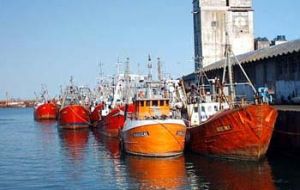MercoPress. South Atlantic News Agency
Argentine: Port of Mar del Plata returns to normal
 The standstill in the sector caused by the union conflict has caused an estimated USD 8 million in losses
The standstill in the sector caused by the union conflict has caused an estimated USD 8 million in losses The port of Mar del Plata, in the Province of Buenos Aires, began to recover its normal momentum after a 10-day blockade. Once the workers accepted the entrepreneurs' proposal on a guaranteed minimum wage and their legalised situation within a 100-day period, the fish skinning workers finally lifted their strike, and the sector's activity has resumed.
On Wednesday, 1 August, intense activity at the docks and processing plants on land became evident. Nevertheless the main jobs consisted of trying to resolve the serious health issues created by tonnes of rotting fish. The dock workers began emptying the cargo of nearly 30 fish-filled vessels, throwing out what was spoiled. "Special measures had to be taken. Workers used face masks, and in some cases even oxygen tanks, since we found that most of the fish was in bad conditions," said Alberto Rosa, president of FECOOAPORT, a federation of co-operatives directed to dock workers and fish skinners. According to Rosa, clean up in some vessels will have to last a few more days as many more litres of water, bleach and other chemical products are needed to put these vessels back in working conditions, he reported to the local press La Capital. Sources from the sector stated that most of the goods ended up becoming supplies for fishmeal plants. Meanwhile, Jorge Raed, area supervisor for Fishery of the National Service of Health and Agri-food Quality of Argentina (SENASA), said that authorities from the entity decided to re-enforce control to keep spoilt fish from slipping into the commercial circuit. Several entrepreneurs from the Mar del Plata fishery industry estimate that the standstill in the sector caused by the union conflict accounts for economic losses of around USD 8 million coupled with the loss of three million kilogrammes of fresh fish. The Subsecretary of the Ministry of Labour of Buenos Aires, Jose Maria Casas, said that the most important point of the agreement reached between that fish skinners and the business executives is that "workers will be collecting ARS 800 (USD 256) despite lower production, and they are now legalised, which guarantees better organisation." The Secretary General of the Maritime Fishers' Union (SIMAPE), Juan Domingo Novero, explained to NOVA that that accord "enters into effect on 6 August, and is good for 100 days, the companies must present their employee and co-operative lists by then." (FIS)




Top Comments
Disclaimer & comment rulesCommenting for this story is now closed.
If you have a Facebook account, become a fan and comment on our Facebook Page!